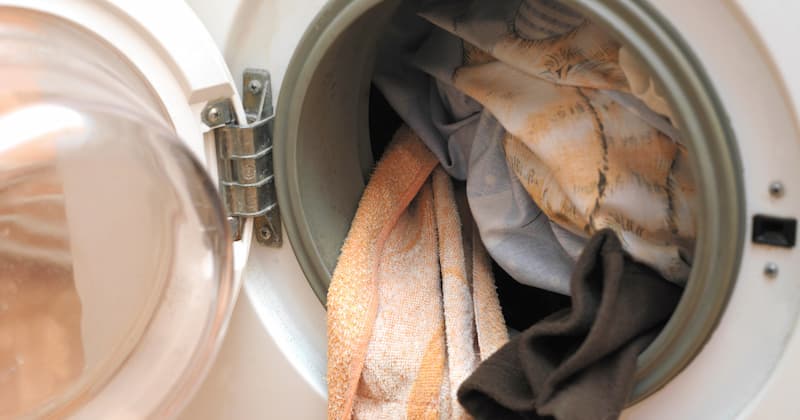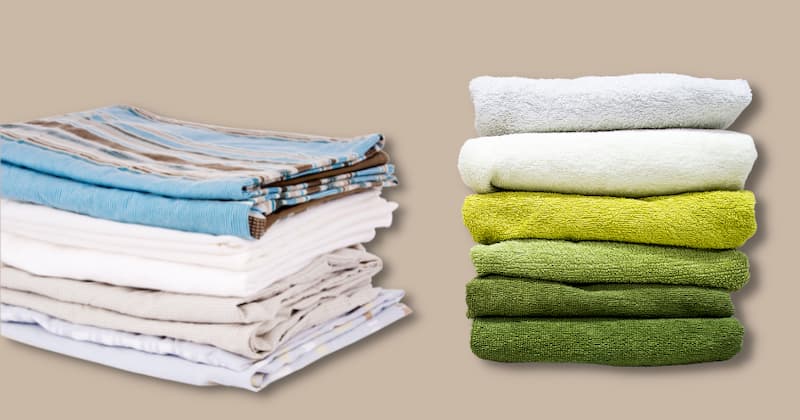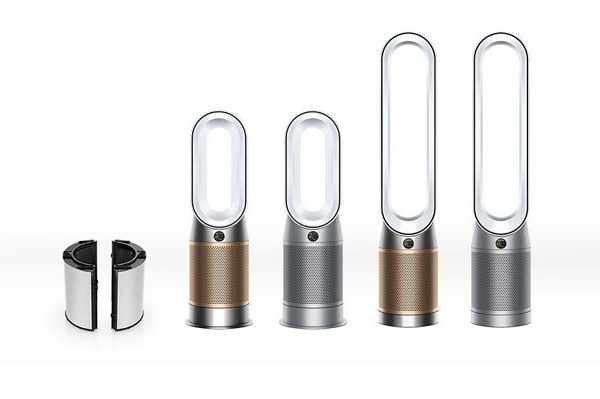Towels and sheets are most likely two of the larger items you wash. It’s also easy to wash towels or sheets. Can you wash your sheets and towels together since they are both large in comparison to your other clothes?
No, you can not wash sheets and towels together. Follow the instructions listed on the tags of these items and always wash clothes, towels, and sheets separately.
When you wash towels, sheets, and kitchen towels with your clothes, you run the risk of contaminating your clothing with bacteria from those other items. Rashes or allergic reactions can occur if you have these substances on your skin, clothing, or bedding for an extended period of time.
Please read on.
Table of Contents
- Can You Wash Sheets And Towels Together: Selecting Laundry Loads
- When Wash Sheets And Towels Together
- What Cycle And Temperature Should Be Used?
- When Not Wash Sheets And Towels Together
- Why You Shouldn’t Wash Your Sheets And Towels Together
- Avoid Things For Washing Your Sheets
- Drying Sheets And Towels
- Do Your Laundry Regularly
- What Should I Wash My Sheets With?
- Do I Need To Wash My Towels Everyday?
- How Ofteh To Wash Other Items, Such As Hand Towels?
- Conclusion
Can You Wash Sheets And Towels Together: Selecting Laundry Loads
There are a lot of people who will tell you that the answer to the question of whether or not you can wash towels and sheets together is no.
‘According to Steve Payne, a bedding and interiors expert at Sleep and Snooze, there are many arguments on the internet for why it is best to wash your towels and sheets separately rather than together.
‘However, washing them simultaneously won’t harm either of them unless you have ivory white bedding and navy blue towels, he adds. ‘You’ll also get praise from the environment for it.’
In order to maintain the condition of the sheets and towels, it’s crucial that you learn how to use and wash them properly.
When Wash Sheets And Towels Together
You should never mix different types of clothing in the washing machine, but you might think about washing towels and clothes together or sheets and towels together if the machine is nearly full. CEO of the upscale dry cleaning company Meurice Garment Care, Wayne Edelman.
, which specializes in interior and wardrobe cleaning services, answers the question of whether you can wash sheets and towels together, ‘Certainly, if not enough for a full load of each.
‘It results in greater efficiencies in terms of water, electric, gas, and other resources as long as they are compatible with each other in a wash load and the load does not grow too large for the machine,’ he says.
What Cycle And Temperature Should Be Used?
To find the best temperature and cycle, look at the laundry symbols on the labels of your sheets and towels. Keep in mind that the sheets may have a lower maximum wash temperature, which you’ll need to adhere to for the load.
‘According to Wayne Edelman, white can withstand hot cycles, light to medium colors are warm, and dark colors are cold. ‘Remember that the surfactant properties of detergents work better to remove stains and soil at warmer temperatures. It may be necessary to wash sheets at a higher temperature and possibly with pre-spotting if they have been exposed to body or massage oils.’
Any detergent will do, but if you want to keep towels soft and absorbent, you should probably skip the fabric softener. ‘Towels should not be washed with fabric softeners because it reduces their ability to hold moisture; however, sheets can be washed with fabric softeners without issue, according to Wayne.
Of course, if you don’t want to go without it for your sheets, this will be a reason to separate the two different types of items in the laundry. See more about What Is Soil Level On Washer: Soil Level Mean On A Washer
When Not Wash Sheets And Towels Together
It’s not the only reason you might decide not to wash sheets and towels together if you prefer to use fabric softener on your sheets but not on your towels. Their color is also important, as was previously mentioned.
According to Wayne Edelman, the rules are as follows: “Red is the color most likely to run, so keep red items separate.” ‘This category also includes items that are black. For the most part, we categorize things into three groups: white, light colors, and dark colors.’
Additionally, keep an eye out for any unique sheet specifications. ‘Some types of sheets need additional care, so you should always read the care instructions on your product’s label to ensure you’re cleaning them correctly,’ explains Logan Foley, sleep science coach and managing editor at Sleep Foundation.org. Use the warmest water setting for sheets made of polyester, as opposed to hot water for cotton, which is typically okay. Even though cotton is the norm for towels, you can double-check by reading the label.

Why You Shouldn’t Wash Your Sheets And Towels Together
To get better results, it’s critical to sort your laundry. But why exactly should you stop washing your sheets and towels in the same load?
Sheets And Towels Don’t Weigh The Same
Lightweight materials like linen, cotton, synthetics, and even silk are used to make sheets. The percale is the most widely used type. Cotton or a cotton-polyester blend is used in a plain weave. Since sheets need to feel soft against the skin, their fabric is typically silky smooth and soft to the touch.
After taking a shower, you use towels to absorb moisture. As a result, they are constructed from stronger and more absorbent materials. Terry cloth made entirely of cotton falls under this category. The surfaces of towels typically have tiny rings that appear feathery if you look closely. The extra moisture is absorbed by these protruding loops.
During the wash cycle, the washing machine tosses your laundry. You run the risk of ripping your bedsheets if you wash your towels and sheets in the same load.
The amount of time needed for washing and drying depends on the weight of the towels and sheets. You can dry and wash sheets for a shorter period of time due to their softer nature and more delicate composition.
Due to their thicker and more durable construction, towels require longer drying and washing times. Drying towels and sheets separately will help you avoid either under- or over-drying.
Towels Produce Excess Lint
Terry cloth, the material used to make towels, essentially produces lint. Lint on clothing is a possibility if you don’t separate towels from the other items in your laundry. When you wash your sheets and towels together in the washing machine, the towel lint might stick to them. Imagine pulling out your freshly dried sheets only to be dismayed by the amount of lint they contain.
Towels Can Get Trapped Inside The Sheets
Have you ever had a wash cycle or drying cycle where your clothes rolled up inside the sheets? Garters are attached to each corner of fitted sheets so they can be fitted to the bed. Other clothing also has a tendency to ball up inside fitted sheets because of this design. The item that is tangled in the sheets won’t be properly cleaned or dried.
It’s best to stop the dryer in the middle of the cycle when washing sheets along with pillowcases or other linens. Once you’ve checked for it, take out anything else that might have gotten wedged between the sheets. The wash cycle can then be restarted after fluffing the sheets. Your laundry will be properly washed if you do it this way. See more about What Is Endure Hybrid?
Avoid Things For Washing Your Sheets
Aside from washing your dirty sheets with your towels, here’s what to avoid when washing sheets:
Avoid Harsh Detergents
Your sheets should ideally be changed at least once per week. Since you change them quite frequently, it is best to stay away from harsh detergents when washing them. This lengthens the lifespan of your preferred bedding.
Avoid A Very Hot Cycle
Your sheets’ fabrics may shrink if you wash and dry them in hot temperatures. To prevent fabric shrinkage, it is best to use moderate temperatures.
Drying Sheets And Towels
It is also possible to dry towels and sheets simultaneously, but drying times will vary. ‘According to Wayne Edelman, sheets typically dry much more quickly than towels. ‘If you are mixing and drinking, I advise stopping the cycle early to check on the condition of the sheets. After checking to see if they are dry, take them out of the dryer and set them aside to air dry. To avoid wrinkling, it is best to fold towels and other items right away after they have been dried.’ Lacking space or enjoying the style? To keep towels in good condition, roll them instead.
Do Your Laundry Regularly
Even though you might consider doing laundry to be one of the most boring chores, it’s one that you should continue to do.
Our bodies are constantly sweating, releasing body oil, shedding dead skin, and exchanging materials with the outside world like dirt and food scraps. Our clothing and every other fabric we come into contact with end up being covered in all of that debris.
You run the risk of transferring bacteria, germs, and odors from one fabric to another when you wash towels and sheets together.
What Should I Wash My Sheets With?
You should wash your sheets and pillowcases every week, though everyone has a different tolerance for dirty linens. The average time between washings for Americans is 24 days! All the sweat, body oil, dead skin, drool, dust, and pet dander that inevitably clings to your sheets and pillowcases is eliminated by washing them.
Although using hot water to wash your sheets after getting sick can help sanitize and remove germs, it is still acceptable to wash your sheets in cold water.
Do I Need To Wash My Towels Everyday?
Even though we might only use our bath towels briefly, the water they come into contact with can quickly lead to health issues. For the sake of avoiding the germs and bacteria that thrive on moist surfaces, we advise washing your bath towels after three uses. If you leave the towels you’re using in the bathroom, you might have to get a new one every other day. This is a result of the high humidity in the space.
How Ofteh To Wash Other Items, Such As Hand Towels?
Frequently, dish towels and hand towels are added to the bath towel stack. Always wash kitchen and dish towels in hot water because they contain a remarkable amount of germs and bacteria. Particularly dangerous are dish towels. More than 17,000 bacteria are present in every square inch of your kitchen sink. Even the kitchen faucet, which serves as a reliable resting place for many dish towels, has about 13,000 bacteria.
Conclusion
When doing laundry, it’s best to avoid washing towels and sheets in the same wash cycle. The results of washing them together are poor. Because they are not made of the same materials, sheets and towels have different weights. Thus, they require a wash and dry cycle that is variable. Furthermore, when you wash your sheets and towels together, lint from your towels may stick to them.
For more laundry and cleaning advice, don’t forget to bookmark our page and follow us on social media!
Regarding your reading, I thank you.



![13 Best Handheld Steam Cleaner In 2022 [Updated]](https://www.searchforbuy.com/wp-content/uploads/2022/09/13-Best-Handheld-Steam-Cleaner-In-2022-Updated.jpg)
